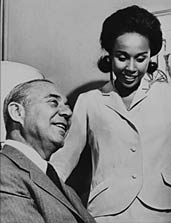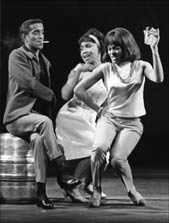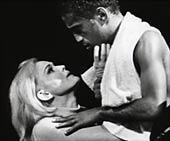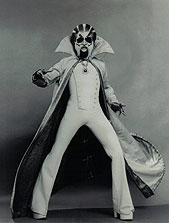Essay
Civil Rights Era on Broadway

Richard Rodgers with Diahann Carroll, the star of his musical "No Strings."
Throughout the country in the early 1960s, the issues of civil rights — voter’s rights and voter registration for blacks, integration, and fairness and equality in the workplace — were in the news and on television nearly every day, but mostly absent on Broadway. In 1962, Richard Rodgers produced the first musical he had attempted since the death of Oscar Hammerstein II, in 1960, an original piece called “No Strings,” for which he would write both the lyrics and the music. Set in contemporary Paris, “No Strings” was about a love affair between an expatriate writer and a fashion model. The model, an American, was played by Diahann Carroll, an exquisite and talented black actress and singer, who had made her Broadway debut in 1954. Although the interracial aspect of the romance was apparent to anyone who was watching, it was never mentioned specifically; Rodgers had Carroll’s character refer to her growing up “north of Central Park.” Well, so had Richard Rodgers, but clearly he meant something else. A show that looked to be socially progressive appeared, upon reflection, to be finicky at best, cowardly at worst.
Producer Hillard Elkins had an obsession with signing Sammy Davis, Jr. to a Broadway contract. It wasn’t the craziest idea in the world; Davis, one of the biggest nightclub and concert attractions of the 1960s, had starred in a 1956 Broadway musical called “Mr. Wonderful,” a semirevue about — imagine that — a talented, young, black nightclub singer, dancer, and impressionist. Elkins caught up with Davis in London and dangled the prospect of adapting Clifford Odets’ 1937 play “Golden Boy” into a musical. The original play was one of the depression era’s great dramas, about a boxer who in his quest for ambition loses his soul — and his life. It would be a serious musical and, in signing Davis, Elkins determined that it would not only be updated but also reflect the struggles of an ambitious young black man in America. The songwriting team of Charles Strouse and Lee Adams were signed, and Odets himself came out of semiretirement to adapt the book.

Sammy Davis, Jr. in "Golden Boy."
As “Golden Boy” moved toward its 1964 opening, the project began to accommodate its star and, more compellingly, its times. Davis’ character was originally called Joe Bonaparte, a poor Italian American, the son of immigrants with a disapproving brother who works as a labor organizer. Here, in one of the show’s rare bits of whimsy, he’s renamed Joe Wellington, a Harlem resident, whose brother now works for CORE (the Congress of Racial Equality). Strouse and Adams provided a score that banked heavily and effectively on urban jazz. One of Davis’ nine numbers (nine numbers, plus a prize fight at the show’s climax, is an unfathomably large load for a performer — even Davis) has him returning as a success to his old neighborhood. In a funky gospel number, Davis and his cohorts mock both white attitudes and George M. Cohan:
Don’t forget One Hundred and Twenty-seventh Street —
Don’t forget your happy Harlem home!
Don’t forget One Hundred and Twenty-seventh Street —
No, siree! There’s no slum like your own!
Don’t forget the cultural life on this here street —
Richer than the outside world suspects!
Hark! The cheerful patter of all the junkies’ feet —
And the soothing tones of Malcolm X!
It was undoubtedly the first time a Broadway audience had heard Malcolm X mentioned in a show. Even better, it was the first time an audience had been confronted with anger, real anger, in a musical for a long time. The social and political frustration in “Golden Boy” — its hero asks, “Who do you fight/When you want to break out/But your skin is your cage?” — brought the anger of the musicals of the 1930s to the issue of civil rights.
In the original, Joe has a doomed love affair with the mistress of his manager, Lorna. In 1964, the woman was still the mistress of the manager, but now she was white. The kiss between Joe and Lorna in Act Two sent off shock waves during the show’s tryouts.

Sammy Davis, Jr. as prize-fighter Joe Wellington with Paula Wayne, playing Lorna Moon.
Although its tryouts were troubled by other creative issues, “Golden Boy” eventually opened as a slick, stark, well-intentioned piece of Broadway craftsmanship, with a dynamite, once-in-a-lifetime performance by Davis at its center. Despite its ethical message, the show still wowed audiences for its sheer performance quality, and Elkins insulated Davis and the company from the various death threats and other hostilities leveled against the musical. Soon after the opening, Martin Luther King Jr. came to see it. He admired its message, particularly a number called “No More”:
Well, you had your way! No more! Well, it ain’t your day No more! Well, I’m standing up, I ain’t on the floor. I ain’t bowin’ down No more!
The early ’70s saw the emergence of several shows where the creative staff and the cast were predominately African American. There were nonlinear musicals that put the urban black experience front and center, like Melvin van Peebles’ “Ain’t Supposed to Die a Natural Death” (1971), with its undercurrent of social protest, and Vinette Carroll’s more celebratory “Don’t Bother Me, I Can’t Cope” (1972), both nurtured by the Black Arts movement. There were more traditional adaptations of earlier black plays, such as “Purlie” (1970), which launched the careers of Cleavon Little and Melba Moore, and “Raisin” (1973), a version of Lorraine Hansberry’s groundbreaking “A Raisin in the Sun.” “Purlie” and “Raisin” achieved a measure of commercial and critical success, but the show’s writers were a mixture of whites and blacks.

André De Shields as The Wiz.
The first completely black mainstream musical of the 1970s came from a time-honored source, THE WIZARD OF OZ. A black producer in New York, Ken Harper, saw the possibilities of reinventing the story in a manner that would access the popularity of Motown, SOUL TRAIN, Afrocentric fashion, and the black urban movies that were developing a greater crossover audience across the country in the early part of the decade. He hired a black composer/lyricist named Charlie Smalls (who, tragically, died soon after the show opened) and got the film company 20th Century Fox to put up the $650,000 investment. “Ease on Down the Road” became the show’s infectious theme, as Dorothy and her three friends ventured forth to see “The Wiz,” but the musical’s tryouts on the real-life road were anything but easy. When it arrived on Broadway at the very beginning of 1975, it met with apathy from the largely white critical community and was on the verge of closing.
Producer Harper bypassed the traditional press campaign to advertise the show and turned directly to the television audience, with a joyous, bubbly commercial aimed — rather unsubtly — at getting black seven-year-olds to ask their parents to “ease on down the road” called Broadway. Coupled with word of mouth and the black community’s skill at organizing theater parties and group sales, the television commercial turned “The Wiz” into a “wow.” It ran 1,672 performances, followed by an immensely successful national tour. There was now a black audience for Broadway shows, an audience that, THE NEW YORK TIMES wrote in 1975, “the white theater establishment has for years been saying did not exist.”
It seemed possible now for black and white audiences to revel in the glories of African-American culture from earlier in the century, and a plethora of revues brought the black music of the 1920s and ’30s to the Broadway stage for the first time since the music first appeared. “Bubbling Brown Sugar” relived the experience of the Harlem Renaissance in 1976, followed by “Ain’t Misbehavin'” in 1978, which was so expert at bringing Fats Waller’s music to the public through an amusing, talented cast of five that it won the Tony Award® for Best Musical. Eubie Blake had his moment in the spotlight — literally, on stage at the age of 94, in “Eubie!” (1979), and Duke Ellington’s song catalogue was elegantly staged as “Sophisticated Ladies” in 1981.
Photo credits: Photofest

